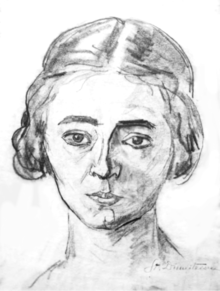Ștefana Velisar Teodoreanu
| Ștefana "Lily" Velisar Teodoreanu | |
|---|---|

Charcoal portrait by Ștefan Dimitrescu
|
|
| Born | Maria Ștefana Lupașcu October 17, 1897 St. Moritz, Switzerland |
| Died | May 30, 1995 (aged 97) |
| Occupation | housewife, translator |
| Nationality | Romanian |
| Period | ca. 1916–1982 |
| Genre | lyric poetry, psychological novel, sketch story, memoir |
| Literary movement | Poporanism |
Ștefana Velisar Teodoreanu (born Maria Ștefana Lupașcu, also credited as Ștefania Velisar or Lily Teodoreanu; October 17, 1897 – May 30 or 31, 1995) was a Romanian novelist, poet and translator, wife of the writer Ionel Teodoreanu. Encouraged to write by her husband, she was a late representative of Poporanist traditionalism, which she infused with moral themes from Romanian Orthodoxy, and also with echos of modernist literature. Her works of youth, coinciding with World War II, and comprise mainly novels centered on the internal conflicts and moral triumphs of provincial women such as herself. Forming a counterpart to her husband's own books, they won praise in their day, but were later criticized for being idyllic and didactic.
An anti-communist like her husband, Velisar helped writers and political figures persecuted by the communist regime. She continued to publish, switching mainly to collaborative translation work until the late 1960s, and earned acclaim for her renditions of Russian literature classics. During the same interval, she was left a widow by her husband's death, which occurred at the height of communist pressures on the family; her brother in law Păstorel was imprisoned, as was her friend Dinu Pillat, while others in her circle fled Romania. Returning to more favor in the late 1960s, Velisar lived a mostly quiet life, and eventually withdrew to Văratec Monastery. Her late work comprised a celebrated memoir of her relationship with Teodoreanu, as well as letters she sent to the Pillat family, which were collected in a 2010 book.
Born in the Swiss resort of St. Moritz, her parents were diplomat Ștefan Lupașcu (1872–1946) and his French wife Maria Mazurier. Her father, a high-ranking Freemason, descended from the boyar nobility of Moldavia. He was the paternal uncle of French philosopher Stéphane Lupasco. Velisar's mother, a former governess, was shunned by Lupașcu, and largely absent from Velisar's life; with her father also away on diplomatic and business trips, she was mostly raised by Romanian relatives. According to stories she later told her friends, Ștefana attended primary school in France. She graduated from the central girls' school in Bucharest, headed by her aunt Maria, wife of the novelist Barbu Ștefănescu Delavrancea.
...
Wikipedia
